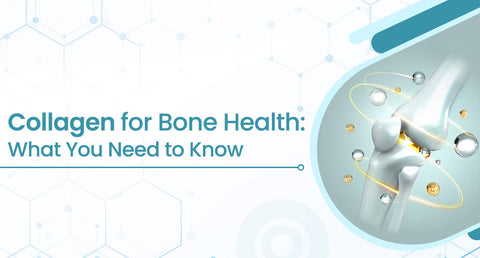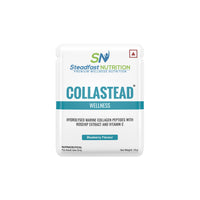Table of Content
Most people immediately think of only calcium and vitamin D when discussing bone health. While there is no doubt that vitamin D and calcium are the staple components for skeletal structure, collagen is another important component that you might be overlooking when it comes to bone health. One of the most abundant proteins in your body, collagen is essential for maintaining bone and joint strength as well as for skin elasticity. Most people are unaware that type-1 collagen helps form approximately 90% of the bone matrix. It is present in tissues of bones, ligaments, tendons and skin as well. Thus, collagen for bone health is just as important as vitamin D and calcium. This post will explore the ways in which diet, lifestyle, and collagen supplements can support your bones, particularly as you age. We'll look at the risk of collagen deficiency, the relationship between collagen and bone health, and natural ways to increase collagen levels.
Understanding bone health
The good health of bones is extremely important for the entire skeletal system. Bones provide structure to the body and promote locomotion for body movement. Bones are dynamic living tissues made of osteocytes. They are not merely inert, hard structures but constantly undergo a remodelling process, involving deposition and resorption to maintain the body’s structural integrity.
The composition of bones
Bone comprises inorganic bone minerals along with collagen fibres.
The minerals that give bones their hardness and strength include calcium and phosphorus. Collagen, an organic constituent in bone matrix, gives flexibility and tensile strength to the skeletal system.
-The above-mentioned components help form bone cells (osteocytes) that also follow the resorption process to fulfil the calcium requirement during bone formation. Even with sufficient calcium levels, bones can become brittle and prone to fractures if there is insufficient collagen due to poor tensile strength.
Factors Affecting Bone Strength
- Age: After the age of 30, bone density gradually decreases after reaching its peak in your 20s. Women are at a greater risk of developing bone issues due to declining estrogen levels after menopause.
- Hormonal changes: Bone loss is accelerated in women during the menopause stage due to the decreased production of oestrogen, which plays a key role in regulating bone resorption and turnover.
- Nutritional deficiency: Inadequate consumption of calcium, phosphorus, vitamin D, and vitamin K makes bones easily prone to fracture or brittle. Deficiencies of these nutrients may affect bone density levels leading to poor bone matrix.
- Poor lifestyle: Consumption of alcohol and smoking interferes with nutrient absorption, impacting bone density.
Prevalent bone health problems are as follows:
-
Osteoporosis: It is the most common bone disease and is caused by poor bone mineral density, which makes bones porous and fragile, causes loss of bone mass and makes affected individuals easily prone to skeletal fractures.
- Osteopenia: It is a condition which is less severe than osteoporosis but can progressively lead to an osteoporosis condition and is characterised by low bone mineral density.
- Osteoarthritis: It is an inflammatory condition that impacts bone health and is caused by the tearing of joint tissues - which creates friction between bones - and also due to poor collagen synthesis. It can be prevented by maintaining adequate collagen levels.
Deficiencies in children may lead to rickets condition while severe cases may also lead to bone tumours and cancer in adults.
Incorporating collagen for bone health can help reduce the risk of these conditions.
What is collagen?
Collagen is a fibrous protein abundantly present in the body, which is made up of amino acids. It provides proper structure, elasticity and strength to the skin and bones, helps in new cell growth, and acts as a connecting network in the body that holds tissues together. Collagen also gives tissues like cartilage, tendons, ligaments, bones, and skin their strength and suppleness. It is necessary for healthy skin, joints, and connective tissues.
The following are the different types of collagen for bone health:
-Type I collagen: Found in bones, skin, tendons and ligaments.
-Type II collagen: Found in elastic cartilage.
-Type III collagen: Found usually in blood vessels, muscles, arteries and skin tissues.
Type I collagen is best for bone health:
Type 1 collagen plays a crucial role in regulating osteoblasts, osteoclasts and osteocytes, which maintain overall bone cell activity. Collagen for bone health creates a framework in bones, providing structural integrity to several connective tissues. Insufficient collagen causes bones to become brittle and rigid, which raises the risk of fracture.
- Flexibility: Collagen fibres allow bones to bend slightly, supporting mobility.
- Strength: Type-1 collagen helps in bone mineralisation and improves overall bone frame, preventing conditions like brittle bones.
- Repair: Collagen for bone health helps repair micro-damage within bone tissues. Collagen for bones also promotes wound healing.
The link between collagen and bone strength
Insufficient collagen in the body can have adverse effects on the entire skeletal system, leading to problems like osteoporosis. Studies demonstrate that postmenopausal women's bone mineral density can be increased by taking collagen. Moreover, Vitamin D, calcium, and collagen work in synergy to strengthen bones. Collagen for bones provides flexibility and elasticity to the hardened bones. This makes collagen for bone health an exciting area of research and a promising addition to bone-supportive strategies.
Chronic stress, poor diet, and aging can all contribute to collagen deficiency. Bones become brittle when collagen levels fall.
-The likelihood of micro-fractures is higher.
-Healing becomes slower.
-A decrease in bone density increases the risk of osteoporosis.
For this reason, taking collagen for bone deficiency can help preserve bone strength over time.
Boosting collagen for better bone health
Natural sources of collagen include:
- Bone broth, containing collagen in the form of gelatin.
- Chicken skin and cartilage
- Fish skin and bones
- Pork skin.
Inadequate dietary consumption of collagen may lead to its deficiency. Vegetarians and vegans should take vitamin C and protein-rich sources to enhance collagen production within the body. Egg whites don’t directly contain collagen but contain proline, glycine, hydroxyproline an amino acid used for collagen production. Similarly, vitamin C, antioxidants and high-protein foods also support the collagen synthesis.
The best collagen supplements are popular because they help fulfil the collagen requirement in the body, promoting bone, skin and joint health.
While choosing a supplement:
Knowing the type and quality of a collagen supplement is crucial, particularly if you want to use it to support bone health. Type I collagen, which constitutes most of the bone tissue and is essential for preserving bone density and strength, is the most advantageous type.
Types of collagen:
-Bovine (cow) collagen: Rich in Type I and III collagen; great for bones and skin.
-Marine (fish) collagen: High in Type I collagen; easily absorbed; supports bone health.
-Chicken collagen: Contains Type II, more beneficial for joints.
Collagen benefits for bone health
- Encourages osteoblast production, which are cells that form bones.
- Increases the density of bone minerals.
- Reduces bone resorption or degradation.
- Promotes the general strength of bones.
For maximum effectiveness, a number of brands now combine collagen supplements with calcium, magnesium, and vitamin D.
- For improved absorption, look for collagen peptides or hydrolysed collagen supplements.
- Try to opt for a collagen supplement that also contains vitamin C, which enhances collagen production.
- Select trustworthy brands that are heavy metal and steroid tested and free from any harmful ingredients.
Besides taking collagen, your lifestyle matters:
- Consumption of vitamin C, which is present in citrus fruits, bell peppers, and strawberries, can support the synthesis of collagen.
- Don't smoke: Smoking weakens bone mass, imbalances the bone turnover and damages collagen.
- Consuming enough protein gives you the amino acids you need to build collagen.
Combining these strategies enhances the benefits of collagen for bone health.
Conclusion
Collagen is as important as calcium for strong, healthy bones. You can increase bone flexibility and resilience by maintaining your collagen levels. Increasing collagen levels - whether through dietary sources, supplements, or lifestyle modifications - can help avoid collagen deficiency and protect your bones from osteoporosis and fractures. Keep in mind that bone health and collagen are closely related and that taking care of your bones now will help you keep them strong and healthy in the years to come.
FAQs
1. How does Collagen affect bone density?
Collagen peptides help form the protein matrix where minerals like calcium are also deposited. Without enough collagen, bones lose flexibility and strength. Studies show collagen supplementation can increase bone mineral density, especially in postmenopausal women.
2. What type of Collagen is best for bone health?
Type I collagen is the most important for bone tissue. Chicken, bone broth and fish are rich sources of collagen. In addition, collagen supplements that contain Type I hydrolysed collagen are ideal for supporting bone health.
3. How long does it take for Collagen to improve bone health?
Research suggests that consistent supplementation for at least 6–12 months is needed to see measurable improvements in bone density. However, individual results may vary depending on diet, age, and activity levels.
4. What foods help boost Collagen naturally?
Foods rich in collagen include bone broth, chicken skin, fish skin, and pork rinds. Additionally, foods high in vitamin C (like citrus, kiwi, and bell peppers) support your body’s natural collagen production.


